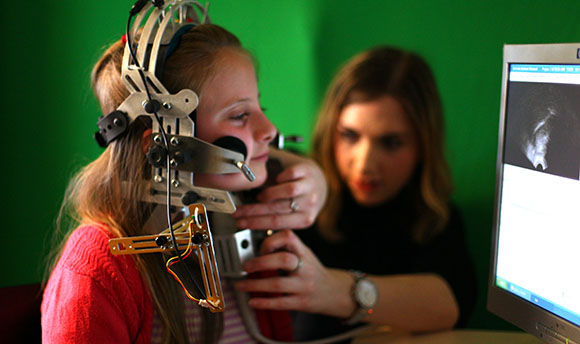Dr Robin J Lickley (MA Hons, PhD) is a Reader in the Speech and Hearing Sciences Division. He is also a full member of the Clinical Audiology, Speech and Language Research Centre (CASL).
- Overview
- Research Interests
- Research Publications
- Funded Projects
- Teaching & Learning
Following my MA in Linguistics at Edinburgh University, I spent 3 years in Italy teaching English, before returning to Edinburgh for my PhD. I worked with Dr Ellen Gurman Bard and Dr Richard Shillcock on a study examining when and how people are able to detect that disfluency is present in speech. During this time, I was also employed for two years at the Centre for Speech Technology Research. On completion of my PhD, Detecting Disfluency in Spontaneous Speech, I spent one year as a postdoctoral fellow at Utrecht University in the Netherlands, with Dr Hugo Quené and Professor Sieb Nooteboom. I returned to the Human Communication Research Centre at Edinburgh University, where, with Dr Gurman Bard, I received 5 years of funding from the ESRC and EPSRC in work that involved annotating the HCRC Map Task corpus for disfluencies and using samples of the corpus to test listeners’ ability to detect, and their tendency to miss, disfluencies in running speech. We also compared human and computer performance in understanding disfluent speech. I also spent 6 weeks with British Telecom as a visiting research fellow, analyzing disfluency in recordings of telephone speech. As a Senior Research Fellow at Edinburgh University, I also worked with Professor Bob Ladd and Dr Astrid Schepmann on prosodic analysis of spontaneous Dutch speech. In 2001, I took up a lectureship at Queen Margaret University.
My interest in disfluency in typical speech led, naturally enough, to an interest in pathological disfluency, including stuttering/stammering and cluttering.
Affiliations/Memberships to Other Organisations:
- Human Communication Research Centre, University of Edinburgh. Honorary Member
- Honorary Fellow of the College of Science and Engineering, University of Edinburgh
Research/Knowledge Exchange Centre Membership:
As a psycholinguist and phonetician, I examine how we produce speech and how we understand it.
Spontaneous speech, with its frequent errors and hesitations, gives us great insight into the mechanisms behind its production.
By studying phenomena in large amounts of spontaneous speech, we can examine factors, either personal or contextual, that affect the probability that a speaker will need to hesitate or will produce an error. We can use this kind of information to inform the design of experiments to test more specific hypotheses.
Disfluencies in speech also present interesting questions for comprehension. In general, it is of interest to explore to what extent the presence of disfluency aids or adversely affects our understanding of speech.
I am also interested in pathological disfluency, such as stuttering and cluttering.
We can learn a lot from corpus studies and experimental work. Careful examination of articulatory processes can also be very revealing.
Active Research Interests:
- Dialogue factors in the production of disfluency.
- Working memory and speech production.
- Personality and disfluency.
- Cluttering severity measurement.
- How listeners miss many disfluencies.
- Hidden speech phenomena – the articulatory evidence for inaudible disfluency.
- Delayed auditory feedback and its effects on typical speakers.
Research Methods:
- Corpus analysis
- Psycholinguistic experimental work
- Articulatory analysis (EPG, Ultrasound, EMA)
Research Grants & Contracts Funding:
2012-2015 Coarticulation and tongue differentiation in children between three and thirteen years old. ESRC £375,000 Con-investogator.
2010-2011 Lingual coarticulation in preadolescents and adults: an ultrasound study ESRC £114,000 Co-investigator
2010 Funding for research on disfluency detection (in Japan) £1800 Carnegie. PI
2009 Funding for joint research seminar ~£1000 Daiwa Anglo-Japanese Foundation (Ref: 7102/7524). Co-investigator
2008-2009 Centre for Innovation and Enterprise in Speech, Language and Audiological Sciences £80000 QMU KT Grant.
2007-2010 An Edinburgh Speech Production Facility (QMU and University of Edinburgh) £600k (£103k to QMU) EPSRC. Co-investigator.
2004-2006 Prosodic ability in children with Asperger's Syndrome. £190k ESRC award to Queen Margaret University College. Co-holder.
My primary teaching/learning areas are:
- Psycholinguistics
- Disorders of Fluency
- Research Methods
- Research Supervision


